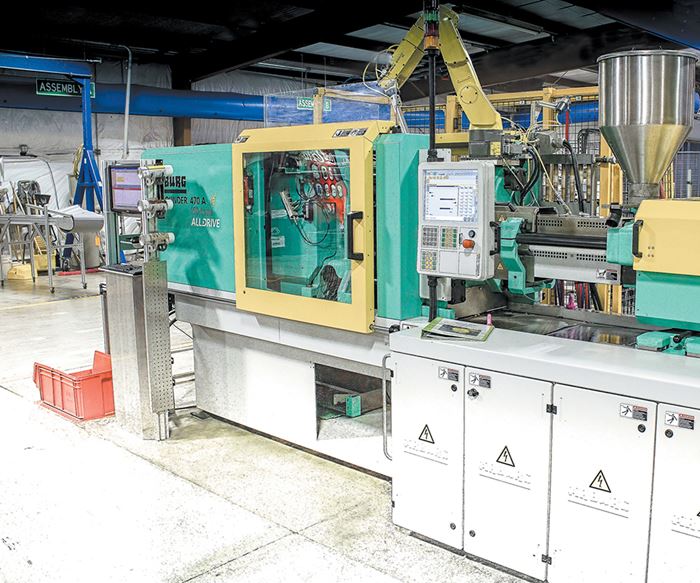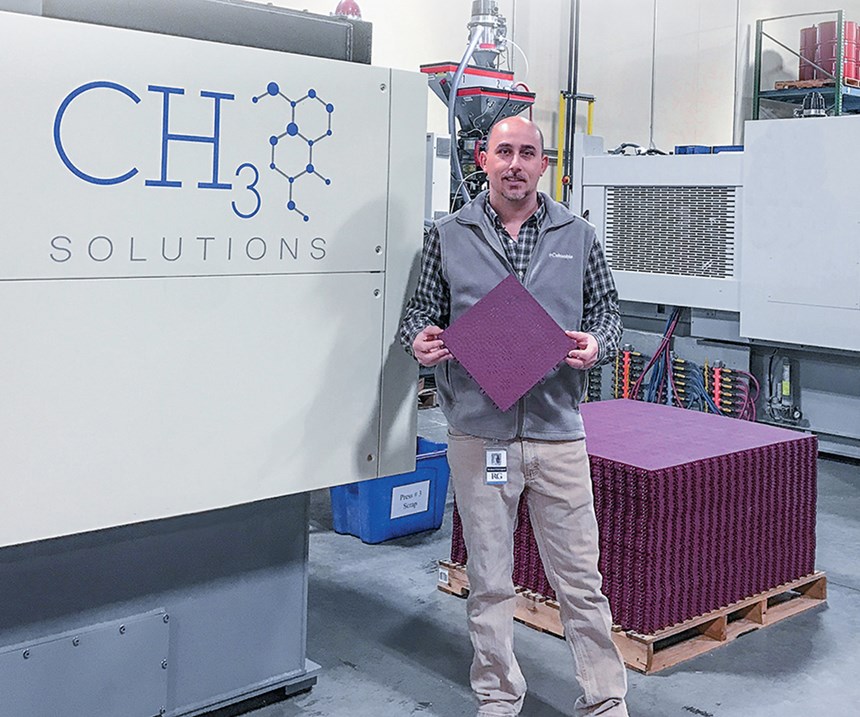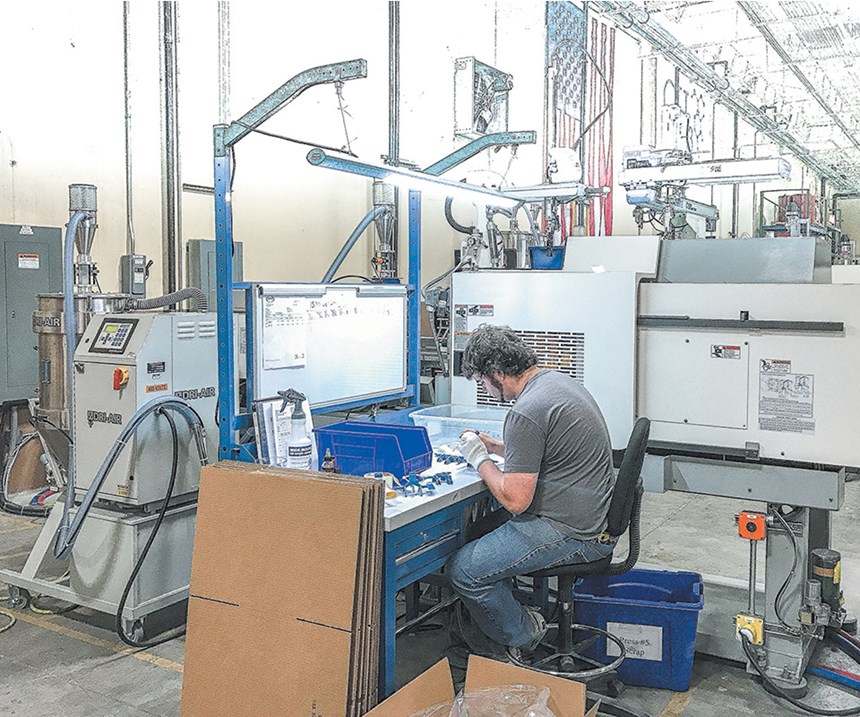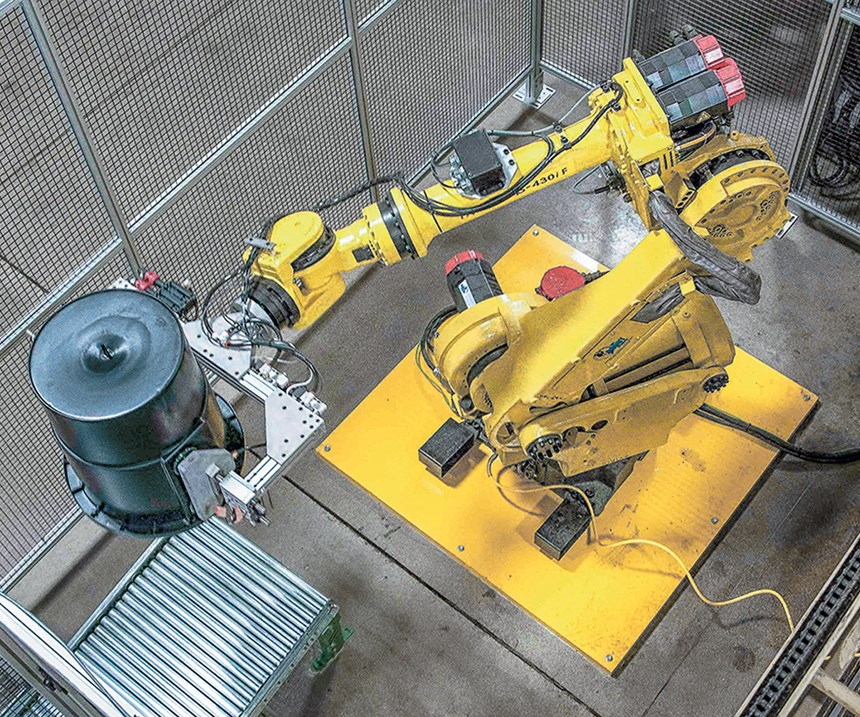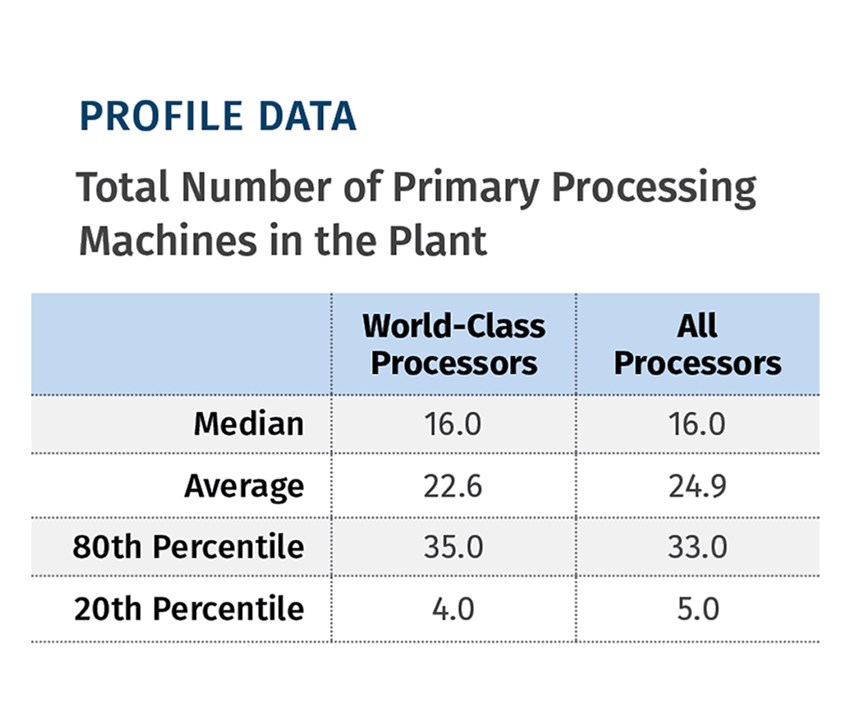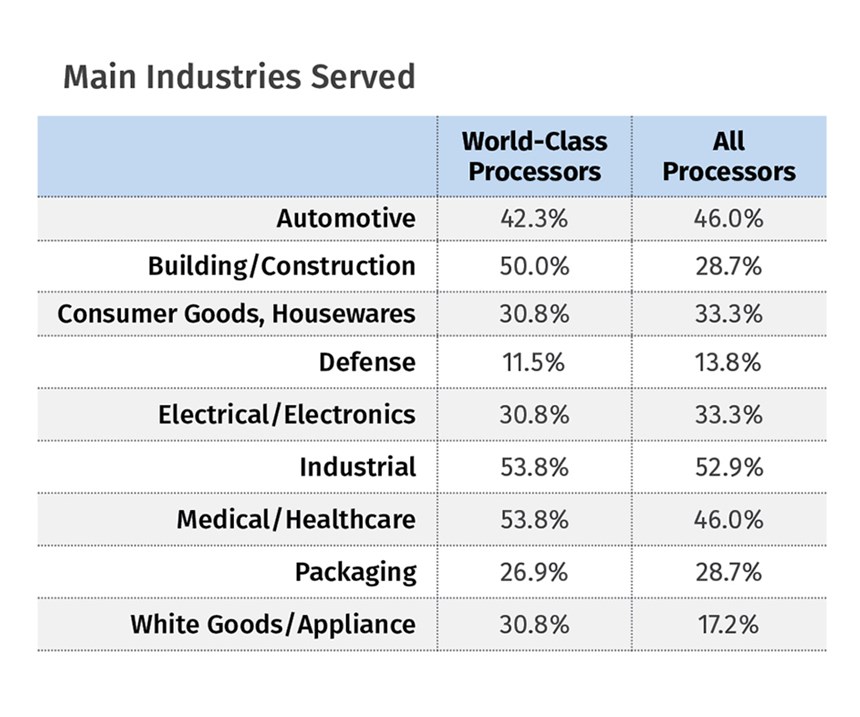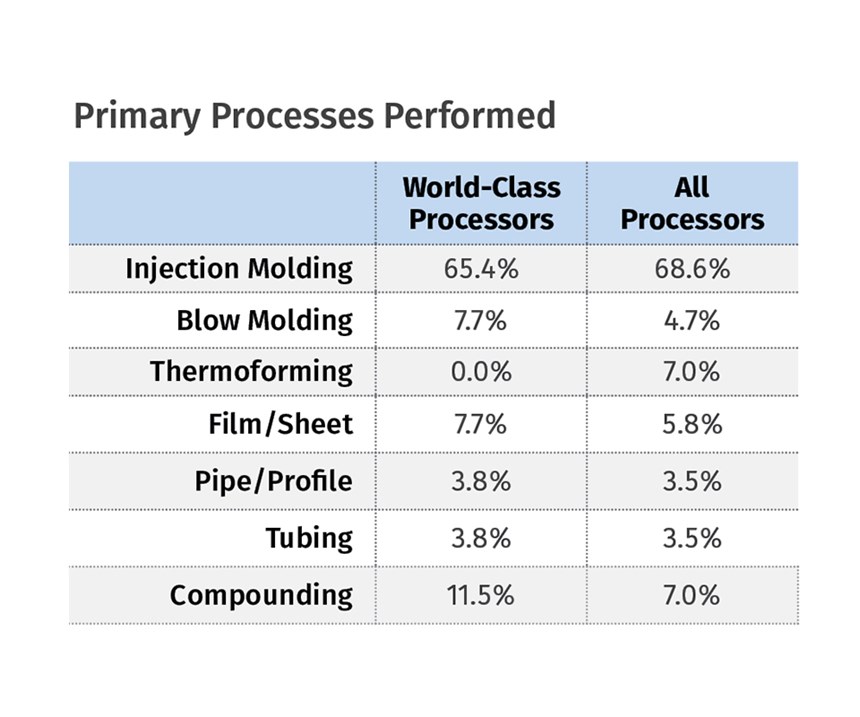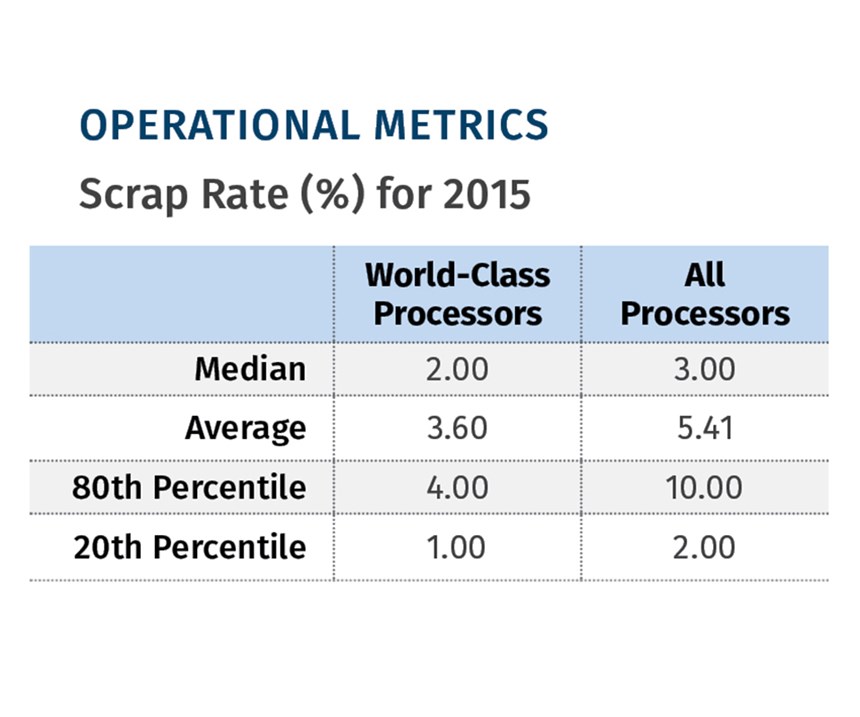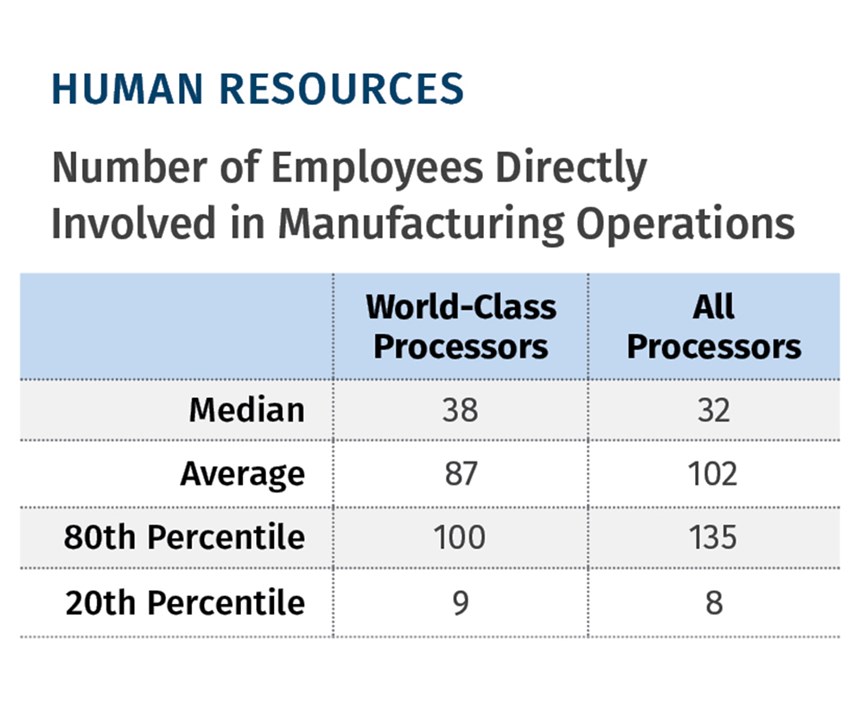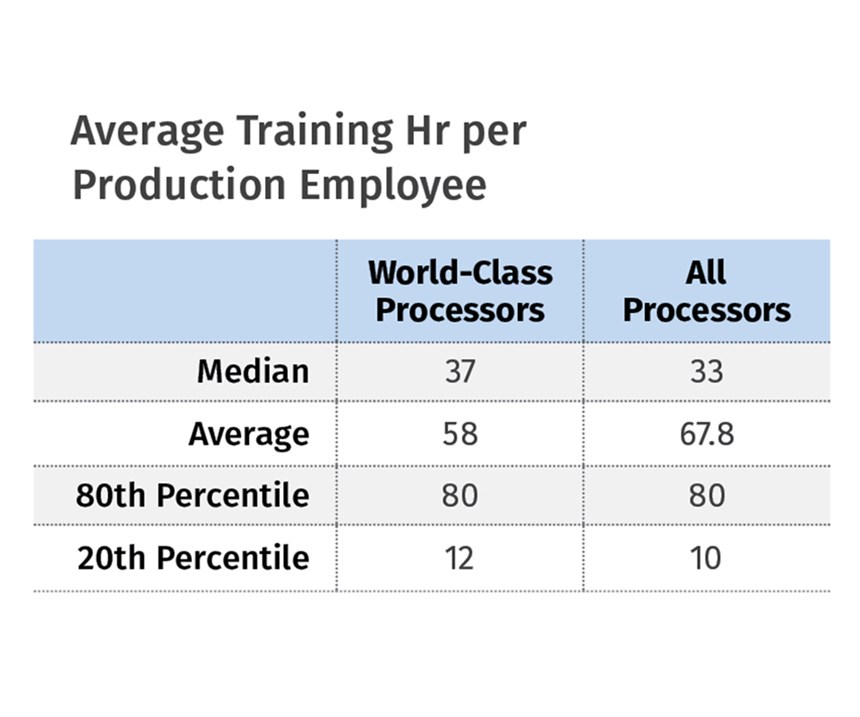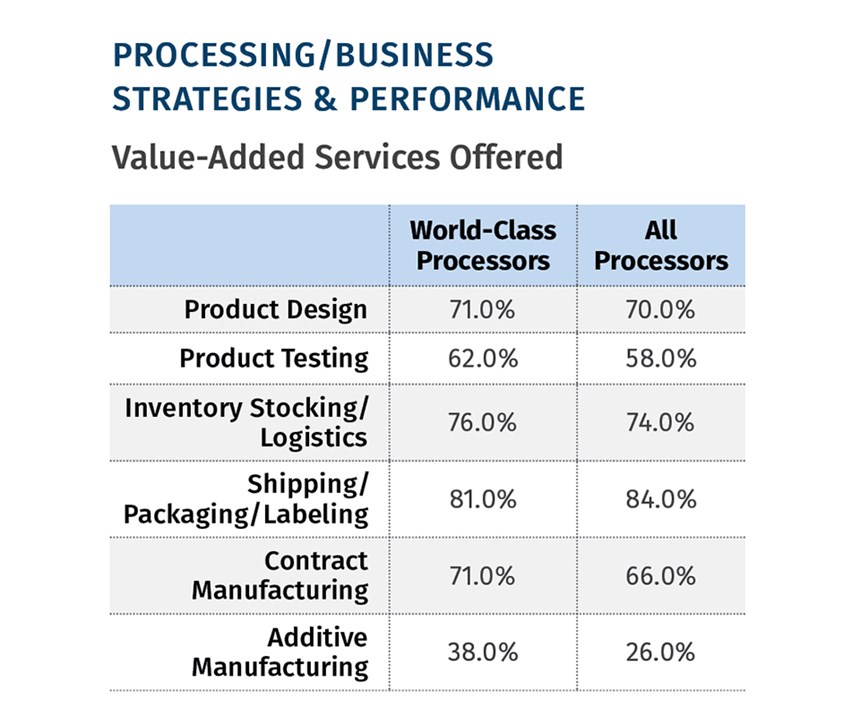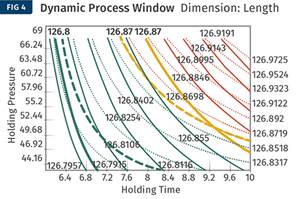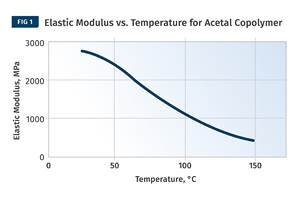World-Class Processors: Meet Plastics' Preeminent Processors
Plastics Technology’s second annual benchmarking survey is back with a new honor roll of companies from across the industry. One of the ties that binds these progressive processors is their reliance on data.
The 2016 selection of World Class Processors once again reflects the eclectic nature of the plastics-processing industry, with winners hailing from different regions, running various technologies, and occupying disparate points on the supply chain. What is once again a common unifying factor is the collection, dissemination, and tactical use of operations data.
“We share performance metrics, because what gets measured gets achieved,” explains Paul Koster, CEO of full-service injection molder Selmax Corp., Selinsgrove, Pa. Selmax was among the 25 members of 2016’s newest group of World Class Processors. Surveys were sent to Plastics Technology’s subscription list, including all major processing technologies. The World Class Processors were selected from the overall pool of respondents to the survey, based on their performance in 11 different metrics. These metrics covered everything from operations and business performance to human resources and operational strategy.
Beyond simply compiling statistics about the output of the shop floor, the winners shared a common culture of using that information to make the company’s success more tangible to the employees who ultimately dictate the company’s success.
“The single biggest initiative we have done to promote involvement in continuous improvement is education of the whole staff on the cost of process inconsistencies,” says Missy Rogers, president of custom injection molder, Noble Plastics Inc., Grand Coteau, La. “Obviously, customers need to receive quality products free from defects, but when you understand how the cost of scrap, waste, and rework don’t just affect the company, but provide a clear measure to tie cost of scrap to cost of sales, everyone sees how his or her contribution to our processes delivers the best value to customers and staff.”
James S. Khorshid, president of Mossberg Industries Inc., Garrett, Ind., a manufacturer of spools and reels with injection molding and extrusion capacity, says his World Class facility also makes a point of sharing operations data. At Mossberg, performance metrics like on-time delivery, as well as customer concerns, are posted monthly in the shop breakroom and are also reviewed in the company’s monthly plant meetings. “We share these items with everyone so they can give direct input if anyone has an idea to improve a process,” Khorshid says.
LINKING PERFORMANCE TO PAY
At injection molder CH3 Solutions, Dalton, Ga., Rodney Davenport, v.p. of manufacturing and quality, says this World Class winner not only shares performance data with its employees but it also discloses its costs and margins so they appreciate the true impact of a scrap part.
“We are completely transparent with employees,” Davenport says. “They know what parts cost us, what we sell them for, and how much it impacts when a part is thrown in scrap or when material spills.” It also impacts the employees’ compensation as well, with bonuses tied to operations performance. “If we need to buy equipment, if we had damage to something and don’t pack good product, they know that directly impacts each person’s pocket at the end of the year,” Dalton says.
Koster says Selmax has a similar linkage between operational performance and pay, deploying the “carrot” of cash to its workers through what it calls a Results Based Incentive (RBI). Selmax posts machine run time, reject rates, and production cycle times daily. RBIs can be earned for every day that the team achieves the targets established for those metrics. “Every employee who works that day earns the incentive,” Koster says, with the RBIs paid out on a quarterly basis. Besides the “carrot,” there is also one “stick”: “If we have a significant safety incident or customer complaint, part or all of the incentive is lost,” Koster says.
Incentivizing workers with cash was a theme amongst our 2016 World Class Processors. While the average compensation for shop-floor personnel was the same $15/hr for our 25 top shops and all others, fully 83% of the World Class Processors offered a bonus, while only 69% of total survey respondents did. The World Class Processors also did a better job of holding onto their employees. The average employee turnover rate for our 2016 World Class Processors was 6.3%, while it reached 9.8% for the survey group as a whole.
A FOCUS ON EQUIPMENT
The World Class Processors Plastics Technology spoke with had something else in common: a keen understanding of the role technology can play in their success. At Mossberg Industries, Khorshid notes that over the last five years, the company has added seven all-electric injection machines, replacing older hydraulic presses, while also installing robots and updating its production tracking system. “When you mix these improvements with a business that dates back more than 100 years, then you can get great results,” Khorshid says. “Product lines and customers have changed over the years, but we continue to focus on supporting our customers and having the highest product quality.”
Custom molder CNR Group LLC, Jackson, Wis., made the World Class list in part thanks to its investments in equipment, in the view of company president, Bob Albrecht. The company’s 10 machines, which range up to 200 tons in clamp force, are all-electric and most are less than five years old. For those 10 machines, CNR has 11 full-time employees, with two of those being certified molding technicians, applying scientific molding principles and robust process development.
CH3 Solutions likewise runs a small but highly efficient fleet. Davenport says that of their five injection machines, four are all- electric and one utilizes servo drives for its hydraulic pumps. CH3 is working on a project that incorporates valve-gated hot runners, gas-assisted injection, and in-mold labeling—all in one tool.
“We’re trying to make sure CH3 is not the same-old typical molder,” Davenport says. “We’re very technology driven and try to stay up to date with the trends in the market and new technology.”
CH3 started molding in 2015 when it couldn’t find someone to make its proprietary flooring product. Davenport notes that even at the beginning, when it couldn’t afford to buy the latest and greatest machinery, CH3 took pride in its equipment. “When we bought our first piece of used equipment,” Davenport says, “we painted it, made it look new. Every employee in the company had hands on. It’s important to have that culture, where people own it.”
Looking at the survey data, there was a slight difference in average machine age between World Class Processors and all participants—12.35 yr vs. 13.08. On the injection side, more World Class molders deployed all-electric machines (54.5% of their fleet) than the full survey group (45.9% all-electric machines). The percentage of revenue that World Class Processors reinvested in capital equipment (12%) was lower than the larger survey group (15.3%), but in total they spent 34% more on capital equipment for the year.
Fully 81% of the World Class Processors had achieved a quality certification, like ISO, compared with 67% for the full survey group. Of the five World Class winners, all acknowledge the importance of certification. Koster noted that Selmax is currently working toward ISO 9001:2015 certification in May. Noble Plastics, CH3, Mossberg Industries are already certified, while CNR Group notes that its quality system conforms to ISO 9001:2000.
SIZING UP THE CLASS
The 2016 World Class contingent was quite diverse, consisting of every kind of business from family-owned to Fortune 500, from OEM to job shop. Of the 25 World Class respondents, 22 chose to be identified and they hailed from 13 states in virtually every region of the country: Arizona, California (two), Georgia, Illinois (two), Indiana (two), Louisiana, Michigan (two), Minnesota, New York (two), Ohio, Pennsylvania, Texas, and Wisconsin (four).
Among them were OEMs, custom and captive injection molders, a resin recycler, and a rapid manufacturing service. The World Class group also deployed all the major processes, save thermoforming, with winners offering injection, blow molding, and several varieties of extrusion, including film/sheet, pipe/profile, tubing and compounding.
Their common characteristic: a unifying company culture undergirded by data. “We display metrics and hold regular meetings to review goals and measures, because communication is key to success,” Noble’s Rogers says. “We believe that our team thrives on a culture aligned with our core values: To do what you say, to care about ‘getting it right,’ and to help people succeed.”
AND THE WINNERS ARE
Of the 25 winners of Plastics Technology’s second annual World Class Processors benchmarking study, 22 agreed to be identified. They are listed below alphabetically:
• 3M, St. Paul, Minn.
• BPC Plastics, Meredosia, Ill.
• CH3 Solutions, Dalton, Ga.
• Closure Systems International Inc., Kilgore, Tex.
• CNR Group LLC, Jackson, Wis.
• Desert Molding Concepts Inc., Victorville, Calif.
• ILPEA Industries Inc., Scottsburg, Ind.
• Mossberg Industries Inc., Garrett, Ind.
• MRC Polymers, Chicago, Ill.
• Noble Plastics Inc., Grand Coteau, La.
• Parker Hannifin Corp., Tucson, Ariz.
• Pigstail USA LLC, Brea, Calif.
• Pioneer Plastics, Marinette, Wis.
• Royal Building Products, Shelby Township, Mich.
• PolyOne, Lockport, N.Y.
• Selmax Corp., Selinsgrove, Pa.
• Seneca Railroad & Mining Inc., Bellevue, Ohio
•Sharp Packaging Systems Inc., Sussex, Wis.
•Toman Thermosonics, Stoddard, Wis.,
•Unitra Inc., Stafford, Tex.
•Urgent Plastic Services, Rochester Hills, Mich.
•Xerox Corp., Webster, N.Y.
Related Content
Three Key Decisions for an Optimal Ejection System
When determining the best ejection option for a tool, molders must consider the ejector’s surface area, location and style.
Read MoreFundamentals of Polyethylene – Part 6: PE Performance
Don’t assume you know everything there is to know about PE because it’s been around so long. Here is yet another example of how the performance of PE is influenced by molecular weight and density.
Read MoreOptimizing Pack & Hold Times for Hot-Runner & Valve-Gated Molds
Using scientific procedures will help you put an end to all that time-consuming trial and error. Part 1 of 2.
Read MoreThe Effects of Time on Polymers
Last month we briefly discussed the influence of temperature on the mechanical properties of polymers and reviewed some of the structural considerations that govern these effects.
Read MoreRead Next
For PLASTICS' CEO Seaholm, NPE to Shine Light on Sustainability Successes
With advocacy, communication and sustainability as three main pillars, Seaholm leads a trade association to NPE that ‘is more active today than we have ever been.’
Read MoreSee Recyclers Close the Loop on Trade Show Production Scrap at NPE2024
A collaboration between show organizer PLASTICS, recycler CPR and size reduction experts WEIMA and Conair recovered and recycled all production scrap at NPE2024.
Read MoreLead the Conversation, Change the Conversation
Coverage of single-use plastics can be both misleading and demoralizing. Here are 10 tips for changing the perception of the plastics industry at your company and in your community.
Read More

